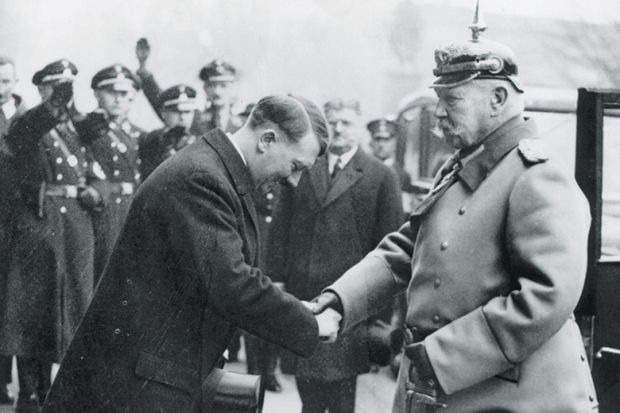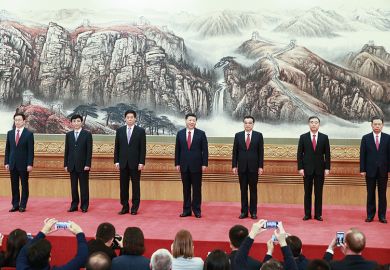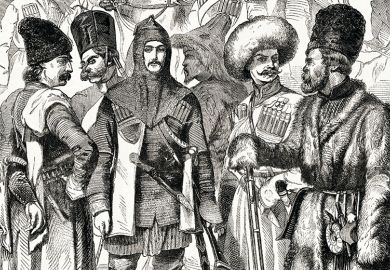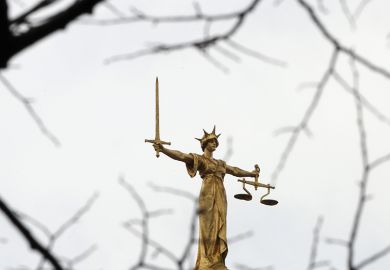How did a billionaire property tycoon with no political experience become president of the United States? How did Britain vote to leave the European Union?
Liberal commentators on both sides of the Atlantic have been struggling to answer those questions since 2016. Overwhelmingly, their interpretations have focused on the motivation of the electorate. Broadsheet feature-writers have dispatched themselves, as if on some purgatorial safari, to Nuneaton and to West Virginia, to ask representatives of the “left behind” how they could have voted in ways that appear to flout their economic interests.
This book by Steven Levitsky and Daniel Ziblatt, two professors of government at Harvard University, suggests that the commentators have all been looking in the wrong place. They argue convincingly that, to understand why demagogues succeed, we should look not to public opinion but to the actions of party elites.
In the all-engrossing present tense of Twitter and rolling news, we have lost historical perspective. We know that we have seen the likes of Donald Trump before – in Nuremberg footage, for example – but we don’t know if he’s as bad as that, and we don’t know how bad things are likely to get. We don’t quite know how we got here, and we certainly can’t see a way out.
This book is not a systematic historical survey: it skips from one potted account to the next to illustrate its argument: from Benito Mussolini’s staged “March on Rome” to Alberto Fujimori’s initially reluctant rise to power in Peru; from democracy’s death spiral in Salvador Allende’s Chile to Vladimir Putin’s postmodern post-democracy. The anecdotes, however, are exceptionally well recounted, and read rather thrillingly as familiar stories told from a counter-intuitive viewpoint.
The precedents chosen are both salutary and concerning. Building on the work of the German political scientist Juan Linz, the authors have developed a litmus test to identify authoritarians in the making: the refusal to recognise opponents as legitimate; the encouragement of violence; attempts to restrict media liberty and so on. Trump ticks all the boxes, but so far he has only probed rather than barged through the containing boundaries of American democracy.
History reveals both continuity and change. Levitsky and Ziblatt note that aspiring despots have always knocked at the doors of power. But since the early 20th century, they have gained office not by means of violent coups, but because party insiders have handed them the keys. Leaders who have found themselves weakened or in political deadlock have invited in popular outsiders, confident that they will be able to control them.
This gamble backfired most notoriously in the wake of the collapsed government in 1930s Germany, when a cabal of conservatives chose Adolf Hitler as chancellor: the nobleman Franz von Papen dismissed concerns by insisting, “Within two months, we will have pushed [him] so far into a corner that he’ll squeal.” The rest, of course, is history; but we have forgotten history’s patterns. David Cameron thought that he was containing the Eurosceptics in his Conservative Party by holding a referendum, but right-wing Brexiteers have taken over mainstream politics in Britain.
Democracies die when elected politicians renounce their role as gatekeepers. In a post-deferential, anti-political age, this process is accelerating. Candidates were once selected by party grandees behind closed doors, but the shift towards open primaries is allowing extremists on to the ballot.
Levitsky and Ziblatt’s defence of smoke-filled rooms is very unfashionable, as is their very notion of democracy. For them, democracy does not mean rule by the people; it means constitutional checks and balances. This goes against the grain of much cutting-edge thinking on both left and right: the opening-up of parties to a wider pool of candidates, the privileging of the grass roots, and the introduction of direct, participatory and deliberative forms of democracy. Left-wing protesters have taken to chanting, “This is what democracy looks like.”
These activists have a point. Representative democracy was being dismissed as obsolete well before the rise of Ukip and Trump. Politicians are increasingly professionalised, and hail from a narrow, entitled demographic. The system has been captured by financial and corporate interests. The powerful are not held to account. But Levitsky and Ziblatt’s approach unlocks the paralysis that has gripped democracy in the West. It suggests that politicians should resist siren calls to give up their status. It reminds us that there is a difference between the system itself and its relatively recent corruption. And it reveals, by implication, that liberals who style themselves as opponents of demagoguery actually reinforce, through their cries of mea culpa, the dangerous populist opposition between “real” voters and “out of touch” elites.
We are unable to effectively counter the threat to democracy posed by Brexiteers and Trump, because insurgents, as Levitsky and Ziblatt illustrate, have long portrayed themselves as advocates of “true” democracy, and have employed false appeals to “common people” to conceal their authoritarian ambitions. Augusto Pinochet, Juan Perón, Recep Tayyip Erdoğan and Viktor Orbán have all claimed to represent “the people” against a corrupt political establishment. The segregationist Alabama governor George Wallace declared in the 1960s: “There is one thing more powerful than the Constitution…That’s the will of the people…the people can abolish a Constitution if they want to.” Yet today, in the West, such posturing is often taken at face value: the “will of the people” is a phrase routinely used to describe the marginal result of the UK’s referendum on EU membership, and to silence elected MPs. Trump and Nigel Farage “resonate”, apparently, with “ordinary people”. Like it or not, we are told, Brexit is the result of working-class voters finally “having their say”. Terrified of being branded “experts”, we disown our capacity to take the long view.
Just as “democracy” is used to undermine democracy with the permission of elected representatives, the authors describe how modern despots tend to dismantle democracy from the inside, entirely within the law. A straightforward attack on democracy would raise the hackles of democracy’s defenders. This more subtle approach is concealed by Western complacency and secured by public consent.
Levitsky and Ziblatt are not convinced by American exceptionalism, the belief that the country’s Constitution provides a bulwark against autocrats. They demonstrate that it is actually unwritten rules and norms of behaviour that have – until recently – protected American democracy. Chief among these are “mutual tolerance” – treating political opponents as rivals, not enemies – and “institutional forbearance”: technically, the Constitution permits the use of executive orders, vetoes and filibustering, but historically these have been deployed sparingly, because they tend to incite revenge. These precious yet intangible heuristics are now being jettisoned by “anti-system” politicians, and they are quickly lost from institutional memory: witness Steve Bannon’s proposed “dismantling of the administrative state” or Jacob Rees-Mogg’s attacks on the Civil Service. We are left with a divisive, gloves-off political culture; an unseemly race to the bottom.
Levitsky and Ziblatt’s proposed solutions are directed primarily – and understandably – at the US. They advocate coalition-building to defend against destructive outsiders, pointing to the uplifting example of the 2016 elections in Austria, where Conservatives voted for the Green Party candidate to stop a far-right extremist becoming president. The authors advise the Democrats to address economic inequality and the racial polarisation of the electorate; and they call for the rebuilding of the Republican Party establishment, which has been distorted and hollowed out by external money and an unhealthy relationship with social media. The GOP in particular has in recent years “behaved like an antisystem party”.
But in an age when public antibodies are activated against the “political class”, and parliamentary democracy no longer seems convinced of its right to exist, it will be a challenge to envisage a defence of the system that doesn’t feel out of date.
Eliane Glaser is senior lecturer in English and creative writing at Bath Spa University and author of Anti-Politics: On the Demonization of Ideology, Authority and the State, to be published next month.
How Democracies Die: What History Reveals about Our Future
By Steven Levitsky and Daniel Ziblatt
Viking, 320pp, £16.99
ISBN 9780241317983
Published 25 January 2018
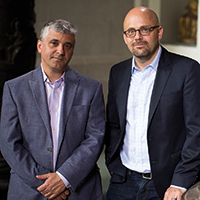
The author
Steven Levitsky (pictured left), professor of government at Harvard University, was born and raised in Ithaca, New York, where his father is a professor at Cornell University. He himself studied at Stanford University, where he was taught, he says, by “Terry Karl, Philippe Schmitter and Larry Diamond, three leading scholars of democratisation”. He also began to travel to Central America, at a time when the region was ravaged by civil wars, an experience that had “a lasting impact” and convinced him to “study democracy and democratisation”.
Daniel Ziblatt (pictured right), also professor of government at Harvard, was born in northern California, did a degree in German studies and politics at Pomona College in Los Angeles and spent three years in Germany, mostly Berlin, in the 1990s, where he “witnessed the early years of the post-communist transition up close” and got “hooked on the study of politics”.
It was the 2016 US presidential campaign and the emergence of Donald Trump that led Levitsky and Ziblatt to start the discussions that eventually led to How Democracies Die . “We were worried,” recalls the former, “that we were seeing and hearing things that we had never seen or heard in American politics – but which we had seen in failing democracies in Europe and Latin America…As we researched, we realised that the problems facing American democracy run deeper than Trump and, sadly, are likely to persist beyond him.”
For his part, Ziblatt “had just finished writing a book on conservative parties in Europe’s historical democratisation and, based on that book’s findings, was worried what the Republican Party’s recent hard push to the right meant for the stability of American democracy”. Although a comparative perspective allowed the authors to see that “American democracy today possesses distinctive sources of resilience”, Ziblatt reflects, it still “faces ominous threats”.
Matthew Reisz
POSTSCRIPT:
Print headline: Political players court popular rogues and the people get trumped
Register to continue
Why register?
- Registration is free and only takes a moment
- Once registered, you can read 3 articles a month
- Sign up for our newsletter
Subscribe
Or subscribe for unlimited access to:
- Unlimited access to news, views, insights & reviews
- Digital editions
- Digital access to THE’s university and college rankings analysis
Already registered or a current subscriber?
